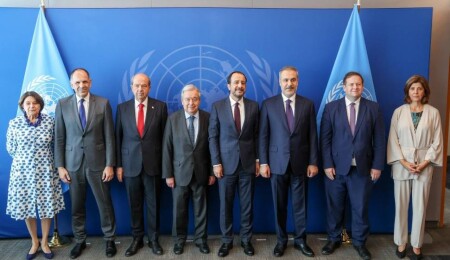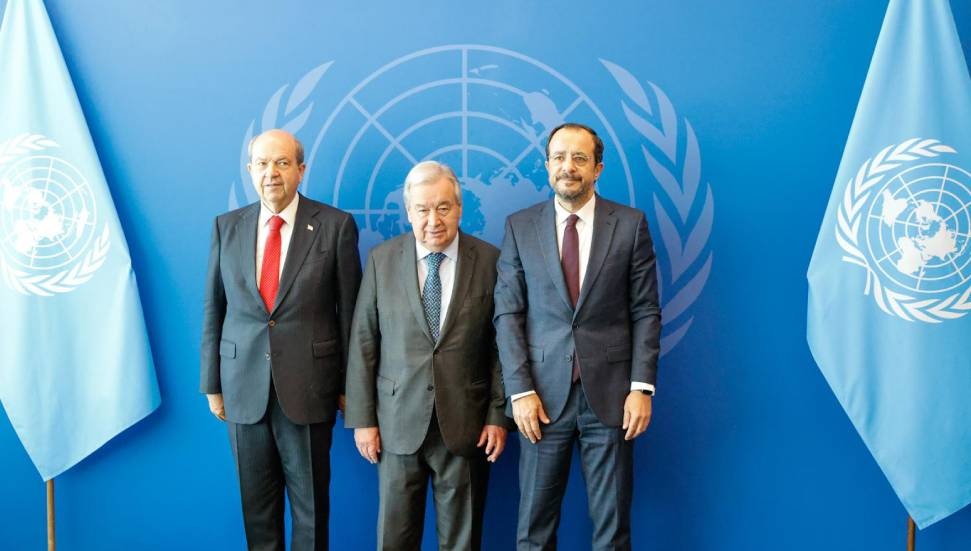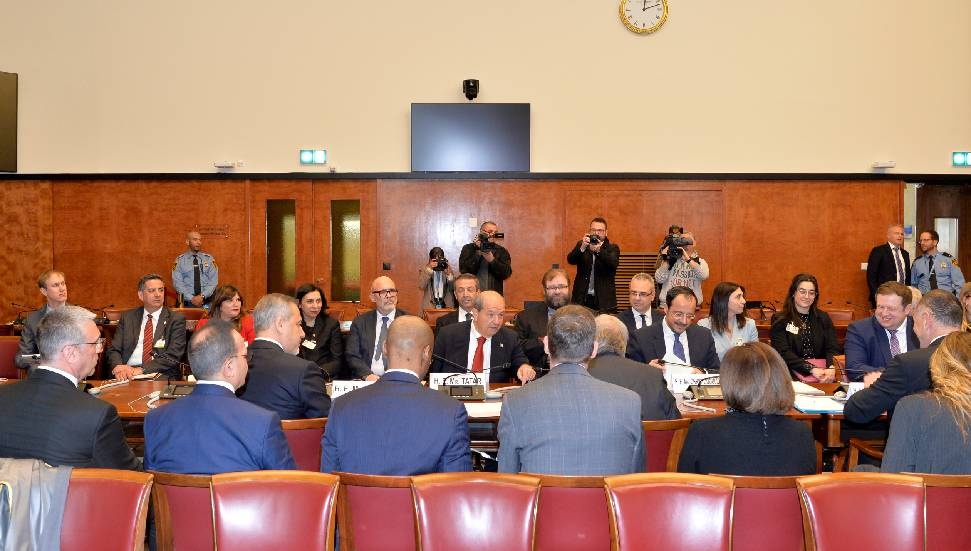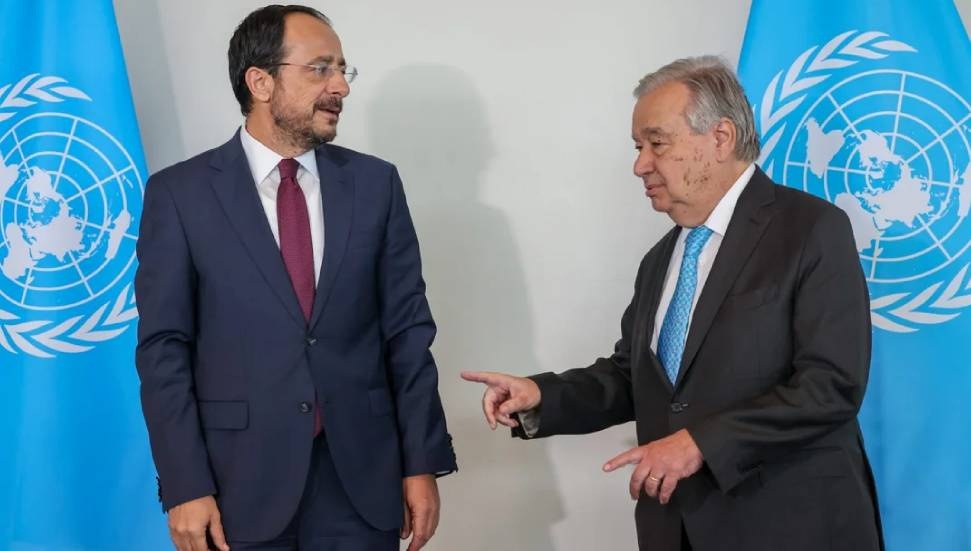Enlarged Cyprus Problem Meeting Ends with More Meetings Planned

The second enlarged meeting on the Cyprus problem to be held this year drew to a close on Thursday evening, with United Nations Secretary-General Antonio Guterres swiftly announcing that further such meetings will take place in the coming months.

Firstly, he said, he will hold a meeting with President Nikos Christodoulides and Turkish Cypriot leader Ersin Tatar in New York during the “high-level week”, the week in which the 80th session of the UN general assembly is to be held.
This year, the general assembly is scheduled to begin on September 9.
In addition, he said a further enlarged meeting, in the style of this week’s meeting, attended by representatives of the island’s two sides, its three guarantor powers, Greece, Turkey, and the United Kingdom, and the UN, will take place “later this year”.
While no date has yet been set for the next enlarged meeting, sources have told the Cyprus Mail that it is expected that the meeting will be held after the Turkish Cypriot leadership election, which is set to take place on October 19.
The Cyprus News Agency reported that the next enlarged meeting will take place “immediately after” that election.
Guterres described Thursday’s discussions as “constructive” and highlighted that progress has been achieved on four of the six initiatives agreed at the previous enlarged meeting on the Cyprus problem, which was held in Geneva in March.
The four areas which saw progress were the creation of a new bicommunal technical committee on youth, initiatives to be taken on the environment, the restoration of cemeteries, and agreements on demining work.
On the matter of demining, he said that the agreement will be finalised “once the final technical details are established”.
However, the two major initiatives agreed upon in March, those being the opening of four new crossing points between the island’s two sides and the creation of a solar farm in the buffer zone, saw no progress in the intervening four months.
Guterres was asked about the matter of crossing points after the conclusion of the meeting, and said the locations of the crossing points have been agreed upon
“We have reached an agreement on the crossing points themselves. There is the question of an itinerary in relation to one of them that will be further discussed now, but there was important progress in this regard,” he said.
He was then pressed on what needs to be done to ensure the opening of a crossing point, but did not go into further detail.
However, as Guterres was making his statements, Turkish Cypriot diplomatic sources were denying to the Cyprus Mail that any agreement had been reached on the crossing points’ location.
“There has been no progress yet on the issue of the crossing points because the Greek Cypriot leader [President Nikos Christodoulides] insists on a transit corridor for use only by Greek Cypriots, instead of a crossing point,” one source said.
By “transit corridor”, the sources were referring to crossing points which would run from one part of the Republic to another through the north, with two such crossing points – through the Turkish Cypriot exclave of Kokkina in the island’s northwest, and between Athienou and the Nicosia suburb of Aglandjia – having been suggested by the Greek Cypriot side.
Away from the matter of crossing points, Guterres had said the sides which were party to the enlarged meeting had come to a “common understanding” on the creation of a “consultative body for civil society engagement”, the exchange of cultural artefacts, an initiative on air quality monitoring, and addressing microplastic pollution.
“It is critical to implement these initiatives – all of them – as soon as possible for the benefit of all Cypriots,” he said, adding that the new initiatives “have the potential to have a real and significant positive impact on people’s lives across the island”.
Christodoulides began his press conference shortly after midnight by saying that better results could have been achieved “if the necessary political will existed”, but stressed that a modicum of progress is better than no progress whatsoever.
“We are seeing small but significant progress, step by step, towards the great goal, which, as [Guterres] mentioned, is the resumption of talks and the resolution of the Cyprus problem,” he said.
He also spoke on the matter of crossing points, saying that the Greek Cypriot side has accepted the Turkish Cypriot side’s proposals for crossing points in the eastern Nicosia suburb of Mia Milia and in the village of Louroujina, which is located between Nicosia and Larnaca.
“We did not just accept the Turkish Cypriot side’s proposal for the two crossing points, one in Mia Milia and one in Louroujina, we expected there to be a response from the Turkish Cypriot side … regarding the corridor from Athienou to Aglandjia,” he said.
On the Greek Cypriot side’s two suggestions, he said there was “some progress” over the prospect of a corridor between Athienou and Aglandjia, but that the Turkish side was “not in a position to make final decisions today” as the consent of the Turkish army would be required.
He added that the same applies to the prospect of a crossing point through Kokkina.
Aside from crossing points, he said the Greek Cypriot side had put forward “five more suggestions” for confidence-building measures, but lamented that “unfortunately, no response was there from the Turkish side”.
“The discussion continues … and we had set as a minimum goal for there to be progress on the measures we had decided in Geneva, and that happened, for there to be new proposals, and that happened, those which will be suggested, and no matter what, for the next meeting to be set, and that has happened, too,” he said.
Tatar, meanwhile, elected to go on the attack during a press conference called shortly after midnight, and spoke for more than twice as long as Christodoulides.
“In the plenary session today and in the bilateral meetings, I expressed my profound disappointment regarding the unfortunate series of incidents which took place on the island following Geneva,” he said, in reference to the arrests made by the Republic of Cyprus of people accused of developing or selling Greek Cypriot-owned property in the north.
“It was our hope that this new atmosphere would provide tangible results on all initiatives which would be to the benefit of the two peoples. I was convinced that the Greek Cypriot side would also try to do its utmost to preserve this new atmosphere, the maintenance of which would compliment and facilitate our work.”
He then said the Greek Cypriot leadership has in the last four months “intensified property-related criminal pursuits against my people”, adding, “these actions by the Greek Cypriot side are certainly damaging to the relations of the two peoples, and are aimed at damaging our economy and our tourism”.
“On the one hand, we are trying to create trust, enhance people-to-people contacts and interaction. The actions of the Greek Cypriot leadership is causing Turkish Cypriot people to be anxious, under pressure, and increasingly threatened. Many Turkish Cypriots are in fear of being arrested or being detained when they cross to south Cyprus or when travelling abroad,” he said.
On this matter, he highlighted the existence of the Immovable Property Commission (IPC), and the fact that it is considered an effective domestic remedy by the European Court of Human Rights.
“As the president of the Turkish Republic of Northern Cyprus, it is my duty to protect my people. Furthermore, I also see it as my duty to work for a sustainable future on our island, which is why I have exercised restraint today and I have not taken reciprocal action,” he said.
He added that the arrests have “been fuelling feelings of resentment [among] Greek Cypriots towards Turkish Cypriots”, and that “more alarming is the indication that this may in fact be its intended purpose”.
“These negative feelings threaten move us further away from each other and from building trust, and this is why these incidents must stop, before it becomes too late,” he said.
On the issue of crossing points, he said “Christodoulides did not fulfil his promise to propose two new crossings”.
“The Greek Cypriot side continues its rigid stance on south-to-south transit corridors which are not crossing points. My approach on this issue has always been guided by a sense of responsibility not just towards my people, but also towards the Greek Cypriot people, our island, and our region,” he said.
“Basically, with these crossing points, we have spent hours this morning… [Guterres] put in a lot of effort to find common ground on these crossing points, but unfortunately, despite our good intentions … Christodoulides and his team insisted that the road, after Athienou would cross through the buffer zone five kilometres further on and go to the other side of Nicosia,” he said.
He added that the Turkish Cypriot side had considered the proposal, and concluded that “we cannot agree that the buffer zone be used for this purpose”, and offered an alternative which he said “would have met the Greek Cypriot expectations”.
He later spoke about the state of the Cyprus problem at large, saying, “we, obviously, in the last four years, have consolidated our new policy, that unless our sovereign equality and equal international status is reaffirmed, we will not resume formal negotiations for the resolution of the Cyprus problem because we believe very much that they are our inherent rights”.
Greek Foreign Minister Giorgos Gerapetritis spoke to his country’s public broadcaster ERT, describing the meeting as “extremely productive”, and adding that the new initiatives agreed upon “create favourable ground for us to be able to proceed with a more substantive discussion in relation to a unified Cyprus”.
“The message of a united Cyprus is necessary today in the world, which is experiencing strife, experiencing wars, and experiencing a great level of intolerance … It is particularly important that the Greek government, in full solidarity with the Republic of Cyprus, continue this great effort, the national goal, which is the reunification of the island,” he said.






Comments
Attention!
Sending all kinds of financial, legal, criminal, administrative responsibility content arising from illegal, threatening, disturbing, insulting and abusive, humiliating, humiliating, vulgar, obscene, immoral, damaging personal rights or similar content. It belongs to the Member / Members.